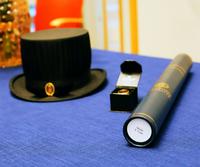
Professor Moshe Vardi is focusing on technology and democracy
Professor Moshe Vardi, Rice University Texas, was appointed honorary doctor at the IT Faculty for 2020. In March 2023, Moshe Vardi held his well-attended lecture "The Tsunami of Technology and Democracy" where he also finally received his insignia.
What are your impressions from visiting the Department of Computer Science and Engineering?
– I enjoyed getting to know a lively and energetic department. I had interesting conversations with leadership on how to build academic excellence, and I enjoyed learning from faculty and graduate students about their research directions. This may lead to further collaborations.
– I also enjoyed seeing my past student, Nir Piterman, now flourishing as a professor.
The topic of your talk as an honorary doctorate was technology and democracy?
– I chose to talk about the negative impact of technology on democracy. For many years, computer scientists like me focused purely on the technical aspects of computer science and left the discussion of societal impact of information technology to other disciplines. Over the past decade, I have come to the conclusion that this is not morally defensible. Technologists must accept that technology has both beneficial and adverse consequences. We must accept our social responsibility, I believe.
What did it mean to you to be appointed honorary doctor?
– Science is a social activity. Scientists want to change the world by influencing the thinking of the scientific community. An honorary doctorate is strong signal from the scientific community to a scientist: "Yes, what you have accomplished is significant".
What are your plans right now?
– While I continue to engage in research on automated reasoning with my students, my main focus is on convincing the computing-research community to accept responsibility for the adverse impacts of information technology.

Nomination text for the honorary doctorate at the IT Faculty:
Professor Moshe Y. Vardi has made considerable contributions to the usage of logic in various fields in computer science. Most notably the logical theory of databases, reasoning about knowledge, the automata-theoretic approach to program verification, and finite-model theory. His contributions were recognized by multiple awards. Professor Vardi is a member of the US national academy of sciences and of engineering and the European Academy of Sciences. He is a prolific writer with a vast number of scientific publications, co-authored with more than 300 co-authors.
In addition to this scientific contribution, Professor Vardi’s service work to the field of computer science is also of a similar magnitude. He has been Editor in chief of the Communications of the ACM for more than ten years and is responsible for a major revival of the journal. He is also very active in the popularization of computer science and has contributed greatly to debates related to the effects Artificial Intelligence has on society and economy and the future of our field.
This unique combination of scientific contributions and service work that promotes the entire computer science community make him a worthy candidate for an honorary doctorate.
Professor Vardi’s connection with the University of Gothenburg is mainly through his long-time collaboration with Dr Nir Piterman from the Department of Computer Science and Engineering. They have worked together on applications of temporal logic to verification and reactive synthesis, automata theory, as well as applications of logic and verification to biological modelling.
(the text is a summary)